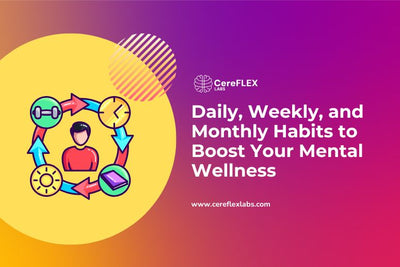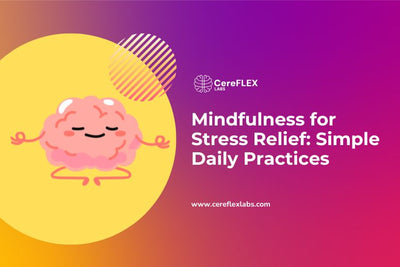Maintaining optimal cognitive function and supplements that support it becomes increasingly important. A sharp memory and clear thinking play a vital role in overall well-being.
Whether you're an athlete looking to improve performance, a health enthusiast aiming for better brain function, or someone over 50 seeking cognitive support, natural supplements can help enhance memory and mental clarity.
From ancient herbs to modern botanical discoveries, research-backed remedies have shown promising results in supporting brain health. In this guide, we’ll explore the best natural supplements to help you optimize your mind for better focus, clarity, and cognitive strength.
What are the best natural supplements for memory?
Incorporating natural herbs and supplements into your daily routine can help improve memory, focus, and overall brain health. Research-backed organic cognitive enhancers and plant-based options support brain function, offering a natural way to enhance mental clarity and retention.

Bacopa Monnieri
Bacopa monnieri is a creeping herb traditionally used in Ayurvedic medicine to enhance memory and cognitive function. Research highlights its potential to support brain health, improve memory, and protect against cognitive decline.1
It is known to boost alertness and thinking skills, reduce anxiety and stress, and enhance focus and attention, particularly in individuals with ADHD. Additionally, it helps balance the nervous system, promoting overall mental well-being.
Dosage Recommendations: 300–600 mg daily with food for better absorption. Consistent use for 6–12 weeks is recommended for noticeable effects.
Side Effects: May cause stomach cramps, nausea, or dry mouth in some individuals.
Ginkgo Biloba
Ginkgo biloba has been widely used in traditional Chinese medicine (TCM) for its potential to support cognitive function and treat dementia. It is believed to enhance brain health by improving circulation and increasing blood flow to the brain.
While research on its effectiveness is mixed, some studies suggest that ginkgo biloba may benefit individuals with Alzheimer's disease or mild cognitive impairment by supporting memory and mental clarity.2
Dosage Recommendations: 60–240 mg daily for up to six months.
Side Effects: May cause an upset stomach, headaches, dizziness, or skin rashes. It can also increase the risk of bruising, bleeding, or irregular heartbeats, particularly for those on blood thinners.
Ashwagandha
Ashwagandha, also known as Indian ginseng or winter cherry, is a well-regarded herb in Ayurvedic medicine. It contains powerful compounds that help combat free radicals, reducing oxidative stress and supporting brain health.
Research suggests that ashwagandha root extract may significantly improve memory, executive function, attention, and processing speed in individuals with mild cognitive impairment.3
It is also known for its adaptogenic properties, which help manage stress and promote overall cognitive resilience.
Dosage Recommendations: 300 mg, taken 2–3 times daily, to regulate cortisol levels and support restful sleep.
Side Effects: High doses may cause stomach discomfort, diarrhea, or vomiting. In rare cases, it has been linked to liver issues.

Ginseng
Ginseng, particularly Panax ginseng, is widely used for its potential to enhance brain function. It is believed to improve memory, focus, and reaction speed while reducing mental fatigue. Additionally, its antioxidant properties help protect brain cells from oxidative stress.
Ginseng contains anti-inflammatory compounds called ginsenosides, which have been studied for their neuroprotective effects. A 2018 review found that ginsenosides may reduce beta-amyloid levels in the brain proteins associated with Alzheimer's disease and cognitive decline. Lowering beta-amyloid accumulation could potentially help slow the progression of neurodegenerative conditions and support overall brain health.
Dosage Recommendations: 200 mg to 3 grams daily for up to 12 weeks.
Side Effects: Long-term use (beyond six months) may cause hormone-like effects. Common side effects include difficulty sleeping, while rare cases may experience severe rash, liver damage, or allergic reactions.
Curcumin
Curcumin is the active compound in turmeric, a spice commonly used in Indian cuisine. It is known for its anti-inflammatory and antioxidant properties, which may help protect the brain from damage associated with conditions like Alzheimer’s disease.
Studies suggest that curcumin can enhance working memory, improve mood and attention, and reduce fatigue. Research has also linked curcumin supplementation to lower levels of brain plaques in regions associated with memory and cognitive function, a key factor in Alzheimer’s progression.5
Dosage Recommendations: Up to 1.5 grams daily for up to nine months.
Side Effects: Generally well-tolerated, but high doses may cause mild stomach upset, nausea, dizziness, or diarrhea.
L-theanine
L-theanine is a naturally occurring compound found primarily in green tea and certain other plants. It is known for its ability to enhance mental alertness, improve reaction time, and support memory.
A study involving 69 adults aged 50 to 69 found that a single 100.6 mg dose of L-theanine significantly improved reaction time and working memory.6
Additionally, L-theanine supplements may help reduce stress and promote a sense of calm and relaxation.
Dosage Recommendations: 100–200 mg per day. Consult a healthcare provider for personalized guidance.
Side Effects: Generally well-tolerated, but excessive intake may cause nausea, an upset stomach, or irritability.
Rhodiola Rosea
Rhodiola rosea is an adaptogenic herb known for its ability to help the body manage stress and combat brain fog. It may also reduce fatigue, anxiety, and depression, contributing to overall brain health.
Research suggests that Rhodiola can enhance memory, focus, and mental clarity, particularly in high-stress situations.7 It is often used by older adults seeking to maintain cognitive sharpness and improve learning ability.
Dosage Recommendations: 100–600 mg daily for up to 12 weeks.
Side Effects: May cause dizziness, dry mouth, or excessive saliva in some individuals.

Lion’s Mane Mushrooms
Lion's mane mushroom (Hericium erinaceus) has gained significant attention for its potential cognitive benefits. Research suggests that lion's mane mushroom for brain health may be particularly effective in supporting memory and overall cognitive function.
Studies indicate that lion’s mane mushroom and its extracts can help reduce memory loss in animal models. They may also protect against brain damage by preventing the buildup of amyloid-beta plaques, which are associated with Alzheimer’s disease.8
Dosage Recommendations: 500–1,000 mg daily, typically taken in capsule or powdered form.
Side Effects: Generally well-tolerated, but some individuals may experience mild stomach discomfort.
Gotu Kola
Gotu kola is a well-known herb in Ayurvedic and Chinese medicine, traditionally used to support memory and brain function. Often referred to as the "herb of longevity," it may help protect brain cells from damage, making it potentially beneficial for individuals with Alzheimer’s disease.
In addition to its neuroprotective properties, gotu kola is known for its anti-inflammatory effects and its ability to promote healing, particularly in blood vessels and arteries. Improved circulation may enhance blood flow to the brain, supporting cognitive function.
A 2021 review in Frontiers in Pharmacology suggested that gotu kola may reduce oxidative stress linked to Alzheimer’s disease and improve cognitive performance.9
Dosage Recommendations: 60–450 mg daily for 4 to 12 months.
Side Effects: May cause nausea or stomach pain in some individuals.
Best Practices for Using Supplements
To maximize the benefits of memory support supplements, follow these guidelines:
-
Start Slowly: Begin with a low dose to assess your body’s response, then gradually increase to the recommended amount.
-
Be Consistent: Most cognitive supplements take time to show effects, so take them regularly for several weeks to achieve optimal results.
-
Support with a Healthy Lifestyle: Combine supplements with a balanced diet, regular exercise, and adequate sleep. Engage in brain-stimulating activities such as puzzles or meditation to enhance cognitive function.
- Follow Dosage Guidelines: Always read product labels and adhere to the recommended dosage provided by the manufacturer or your healthcare provider.
Safety Considerations for Seniors and People with Health Conditions
For seniors and individuals with pre-existing health conditions, it’s essential to take precautions when introducing new supplements:
-
Consult Your Doctor: Before starting any supplement, speak with your healthcare provider, especially if you have conditions such as heart disease, diabetes, or high blood pressure. Certain supplements, like Ginkgo Biloba and Ashwagandha, may interact with medications.
-
Monitor for Side Effects: Pay attention to how your body reacts. If you experience dizziness, headaches, or stomach discomfort, reduce the dosage or discontinue use and consult your doctor.
-
Check for Drug Interactions: Some supplements can influence blood flow, hormone levels, or metabolism, potentially interfering with prescription medications. A healthcare professional can help ensure safe combinations.
Integrating Supplements into a Healthy Lifestyle
While natural memory-boosting supplements can be beneficial, they work best when combined with a healthy lifestyle. A diet rich in omega-3 fatty acids, antioxidants, and essential vitamins plays a crucial role in supporting brain health.
Regular exercise increases blood flow to the brain, promotes the growth of new brain cells, and reduces stress. Adequate sleep is also essential for memory consolidation and cognitive function. Together, these habits enhance the effectiveness of memory-supporting supplements.
Tips for Maintaining a Brain-Healthy Lifestyle
Incorporating healthy habits into your daily routine can significantly improve cognitive function and long-term brain health.
-
Practice Mindfulness and Meditation: Reducing stress through mindfulness and meditation can improve focus and support memory retention.
-
Stay Mentally Active: Engage in brain-stimulating activities such as puzzles, reading, or learning new skills to keep your mind sharp.
-
Maintain Social Connections: Strong social interactions have been linked to better brain function and a lower risk of cognitive decline.
-
Manage Stress Effectively: Chronic stress can impair memory, so prioritize stress-reducing activities like exercise, hobbies, or relaxation techniques.
-
Limit Alcohol and Tobacco Use: Excessive alcohol consumption and tobacco use can negatively impact brain function over time.
-
Stay Hydrated: Proper hydration is essential for cognitive performance and overall brain health.
Conclusion
Maintaining brain health requires a holistic approach, combining natural supplements with a balanced diet, regular exercise, and sufficient sleep. While supplements like Bacopa Monnieri, Ginkgo Biloba, and Lion’s Mane Mushroom can enhance cognitive function, their benefits are maximized when integrated into a well-rounded lifestyle.
For a science-backed solution, CereFLEX Labs' AM/PM Brain Formulas offer targeted support. The AM Formula enhances cognitive performance, energy, and focus, while the PM Formula promotes restful sleep for optimal mental recovery. Together, these formulas provide a natural and effective way to support long-term brain health.
Ready to improve your cognitive function? Explore CereFLEX Labs' AM/PM Brain Supplement Package and take a step toward peak mental performance.






